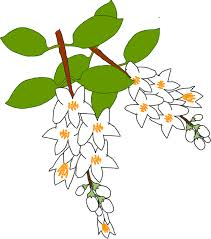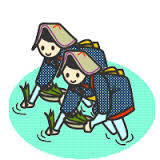|
こちらでYouTube版の「夏は来ぬ」が聴けます。
mp3の音源はこちらです。

1.
卯(う)の花の、匂う垣根に
時鳥(ほととぎす)、早(はや)も来(き)鳴きて
忍音(しのびね)もらす、夏は来(き)ぬ
On the hedges of brilliantly-shining hydrangeas
Little cuckoos are already cooing
Their whispering notes―summer is here
2.
さみだれの、そそぐ山田に
早乙女(さおとめ)が、裳裾(もすそ)ぬらして
玉苗(たまなえ)植(う)うる、夏は来ぬ
Hard rain in the early-summer hillside paddies
Women, the hems of work clothes soaked with water
Are planting rice in the paddies―summer is here
3.
橘(たちばな)の、薫(かお)るのきばの
窓近く、蛍(ほたる)飛びかい
おこたり諌(いさ)むる、夏は来ぬ
Under the orange-smelling house eaves
Fireflies are circling near the windows
To remind you always to keep busy―summer is here
4.
楝(おうち)ちる、川べの宿の
門(かど)遠く、水鶏(くいな)声して
夕月すずしき、夏は来ぬ
At the riverside house the leaves of bead trees are falling
Ruddy-breasted crakes squeal far from the gate
The moon looking bright and clear―summer is here
5.
五月(さつき)やみ、蛍飛びかい
水鶏鳴き、卯の花咲きて
早苗(さなえ)植えわたす、夏は来ぬ
At night in the rainy season fireflies are circling around
Ruddy-breasted crakes are squealing and hydrangeas blooming
Rice seedlings all planted―summer is here

●1番の「卯の花」はウツギの花の別称だが、それに相当する deutzia は英語圏の日常には馴染みのない語である。そこで「ウツギ」属の中でも日常性の高い語である「アジサイ」(hydrangea)で代用させた。
●3番の「おこたり諫(いさ)むる」という箇所の「おこたり」を日本人学習者のほとんど全ては“laziness”を充てるだろうが、英語ではそのようなマイナス語句を避けて上の例のように“remind
you always to keep busy ”とプラス表現を用いるのが普通だ。
●4番の「水鶏 ( くいな )」は我が国ではヒクイナを指すことが多い。したがって、ここではヒクイナに当たる英語のruddy-breasted
crakeを使用する。この語に馴染みがないという外国人には"reddish water bird"(赤っぽい水鳥)と説明すればよい。 |
無断引用禁止 COPYRIGHTED©
|

